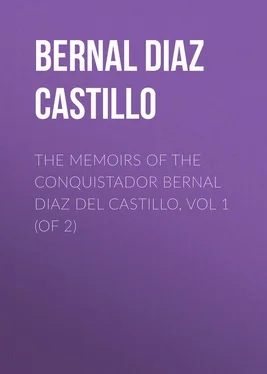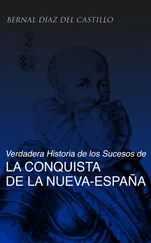Bernal Díaz del Castillo - The Memoirs of the Conquistador Bernal Diaz del Castillo, Vol 1 (of 2)
Здесь есть возможность читать онлайн «Bernal Díaz del Castillo - The Memoirs of the Conquistador Bernal Diaz del Castillo, Vol 1 (of 2)» — ознакомительный отрывок электронной книги совершенно бесплатно, а после прочтения отрывка купить полную версию. В некоторых случаях можно слушать аудио, скачать через торрент в формате fb2 и присутствует краткое содержание. Жанр: foreign_antique, foreign_prose, на английском языке. Описание произведения, (предисловие) а так же отзывы посетителей доступны на портале библиотеки ЛибКат.
- Название:The Memoirs of the Conquistador Bernal Diaz del Castillo, Vol 1 (of 2)
- Автор:
- Жанр:
- Год:неизвестен
- ISBN:нет данных
- Рейтинг книги:3 / 5. Голосов: 1
-
Избранное:Добавить в избранное
- Отзывы:
-
Ваша оценка:
- 60
- 1
- 2
- 3
- 4
- 5
The Memoirs of the Conquistador Bernal Diaz del Castillo, Vol 1 (of 2): краткое содержание, описание и аннотация
Предлагаем к чтению аннотацию, описание, краткое содержание или предисловие (зависит от того, что написал сам автор книги «The Memoirs of the Conquistador Bernal Diaz del Castillo, Vol 1 (of 2)»). Если вы не нашли необходимую информацию о книге — напишите в комментариях, мы постараемся отыскать её.
The Memoirs of the Conquistador Bernal Diaz del Castillo, Vol 1 (of 2) — читать онлайн ознакомительный отрывок
Ниже представлен текст книги, разбитый по страницам. Система сохранения места последней прочитанной страницы, позволяет с удобством читать онлайн бесплатно книгу «The Memoirs of the Conquistador Bernal Diaz del Castillo, Vol 1 (of 2)», без необходимости каждый раз заново искать на чём Вы остановились. Поставьте закладку, и сможете в любой момент перейти на страницу, на которой закончили чтение.
Интервал:
Закладка:
Bernal Díaz del Castillo
The Memoirs of the Conquistador Bernal Diaz del Castillo, Vol 1 (of 2) / Written by Himself Containing a True and Full Account of the Discovery and Conquest of Mexico and New Spain
The History of the Conquest of New Spain is a subject in which great interest is felt at the present day, and the English public will hail these memoirs, which contain the only true and complete account of that important transaction.
The author of this original and charming production, to which he justly gives the title of 'The True History of the Conquest of New Spain,' was himself one of the Conquistadores; one who not only witnessed the transactions which he relates, but who also performed a glorious part in them; a soldier who, for impartiality and veracity, perhaps never had his equal. His account is acknowledged to be the only one on which we can place reliance, and it has been the magazine from which the most eloquent of the Spanish writers on the same subject, as well as those of other countries, have borrowed their best materials. Some historians have even transcribed whole pages, but have not had sufficient honesty to acknowledge it.
The author, while living, was never rewarded for the great services he had rendered his country, and it is remarkable that, after his death, his very memoirs were pillaged by court historians, to raise a literary monument to themselves.
Most of the other writers on the conquest, particularly the Spanish, have filled their works with exaggerations, to create astonishment and false interest; pages are filled with so termed philosophical remarks, which but ill supply the place of the intelligent reader's own reflections. Bernal Diaz differs widely from those writers, for he only states what he knows to be true. The British public, fond above all others of original productions, will peruse with interest and delight a work which has so long been the secret fountain from which all other accounts of the conquest, with the exception of those which are least faithful, have taken life.
In respect of its originality, it may vie with any work of modern times, not excepting 'Don Quixote.' The author seems to have been born to show forth truth in all its beauty, and he raises it to a divinity in his mind. Can anything be more expressive of an honest conscience than what he says in his own preface: "You have only to read my history, and you see it is true."
The reader may form a general idea of this work from the following critique, which Dr. Robertson, the historian, passes upon it: "Bernal Diaz's account bears all the marks of authenticity, and is accompanied with such pleasant naïveté, with such interesting details, with such amusing vanity, and yet so pardonable in an old soldier, who had been, as he boasts, in a hundred and nineteen battles, as renders his book one of the most singular that is to be found in any language."
One circumstance, and that very justly, he is most anxious to impress on your mind, namely, that all the merit of the conquest is not due to Cortes alone; for which reason he generally uses the expression "Cortes and all of us."
This is an allowable feeling in our old soldier, and it must be remembered that the greater part of the men who joined Cortes were of good families, who, as usual on such expeditions, equipped themselves at their own expense, and went out as adventurers of their own free choice.
With respect to our author's style of writing, it is chiefly characterized by plainness and simplicity, and yet there are numerous passages which are written with great force and eloquence, and which, as the Spanish editor says, "could not have been more forcibly expressed, nor with greater elegance." Some readers may at first feel inclined to censure our author for going into minute particulars in describing the fitting out of the expedition under Cortes; for instance, his describing the qualities and colours of the horses; but all this, it will be seen, was of the utmost importance to his history, and of the horses he was bound to take special notice, for they performed a conspicuous part in the conquest. The honest old soldier even devotes a couple of his last chapters to the whole of his companions in arms, in which he mentions them all by name, describes their persons, their bravery, and the manner in which they died.
To conclude these few remarks on this work, I must observe, that it not only surpasses Cortes' despatches in completeness, but also in truth and naïveté. He represents the whole to you with a simplicity truly sublime; at times he astonishes with a power of expressing his sentiments peculiar to himself, and with a pathos that goes to the very heart.
Bernal Diaz was of a respectable family, and born in Medina del Campo, a small town in the province of Leon. He was what in Spain is termed an hidalgo – though by this little more was signified than a descent from Christian forefathers, without any mixture of Jewish or Moorish blood. With respect to the precise year of his birth he has left us in the dark, but, according to his own account, he first left Castile, for the New World, in the year 1514; and as, on his first arrival in Mexico, in the year 1519, he still calls himself a young man, we may safely conclude that he was born between 1495 and 1500. In the year 1568 he completed his work, at which time there were only six of the Conquistadores alive, and he must then have been about seventy years of age, but there is every reason for supposing that he reached the advanced age of eighty-six. Endowed with singular nobleness of mind, he had the happiness to enjoy an unblemished reputation.
The excellent Torquemada, in speaking of him in his voluminous work entitled 'Monarchia Indiana,' says, "I saw and knew this same Bernal Diaz in the city of Guatimala; he was then a very aged man, and one who bore the best of reputations." Quoting him in another passage, he has, "Thus says Bernal Diaz del Castillo, a soldier on whose authority and honesty we can place reliance." He was a man devoted to his religion, and it must be particularly borne in mind that the Catholic faith was never stronger than at that time; yet we find him the least superstitious of all the Spanish historians on the Conquest, and, in the 34th Chapter, he has shown a mind superior to the times in which he lived.
If we contemplate the period in which the conquest of New Spain took place, we can easily imagine that Cortes considered it imperative on him to plant his religion among the Indians by the power of the sword, if he could not by kind remonstrances; and we are often reminded of Joshua in the Old Testament. The Spaniards themselves certainly entertained that idea; for in the edition of Cortes' despatches published at Mexico in 1770, his sword is termed, "Gladius Domini et Gideonis: " yet the Spaniards were not the cruel monsters they have generally been described during those times. As far as the conquest of New Spain is concerned, they were more humane than otherwise; and if at times they used severity, we find that it was caused by the horrible and revolting abominations which were practised by the natives. We can scarcely imagine kinder-hearted beings than the first priests and monks who went out to New Spain; they were men who spent their lives under every species of hardship to promote the happiness of the Indians. Who can picture to his mind a more amiable and noble disposition than that of father Olmedo? He was one of the finest characters, Dr. Robertson says, that ever went out as priest with an invading army!
We may have become exceedingly partial to a work which has now been constantly before our eyes for the last two years, yet we can scarcely imagine that any one could take up a volume, whether a novel or a history, which he would peruse with more delight than these memoirs.
Читать дальшеИнтервал:
Закладка:
Похожие книги на «The Memoirs of the Conquistador Bernal Diaz del Castillo, Vol 1 (of 2)»
Представляем Вашему вниманию похожие книги на «The Memoirs of the Conquistador Bernal Diaz del Castillo, Vol 1 (of 2)» списком для выбора. Мы отобрали схожую по названию и смыслу литературу в надежде предоставить читателям больше вариантов отыскать новые, интересные, ещё непрочитанные произведения.
Обсуждение, отзывы о книге «The Memoirs of the Conquistador Bernal Diaz del Castillo, Vol 1 (of 2)» и просто собственные мнения читателей. Оставьте ваши комментарии, напишите, что Вы думаете о произведении, его смысле или главных героях. Укажите что конкретно понравилось, а что нет, и почему Вы так считаете.












